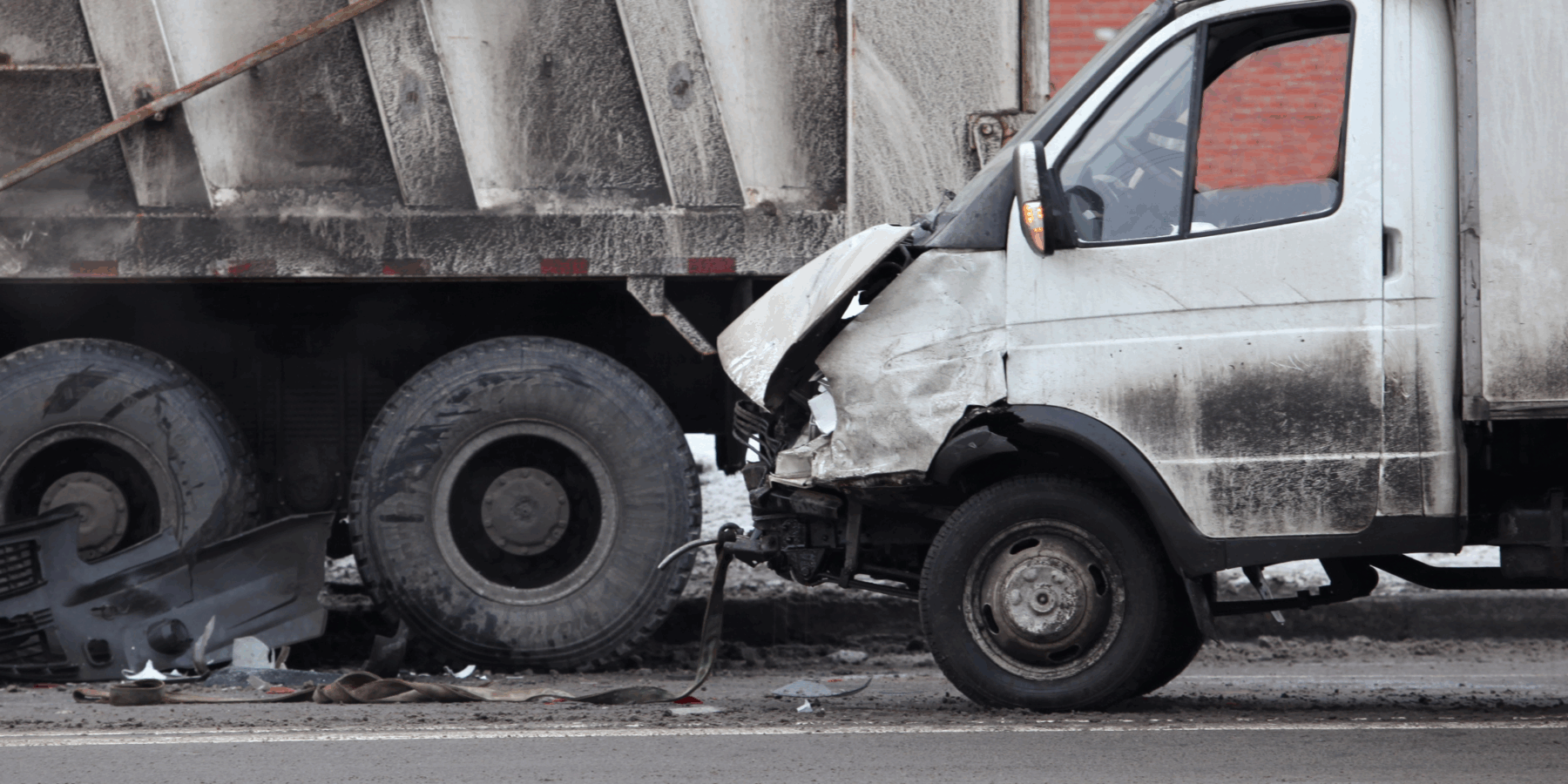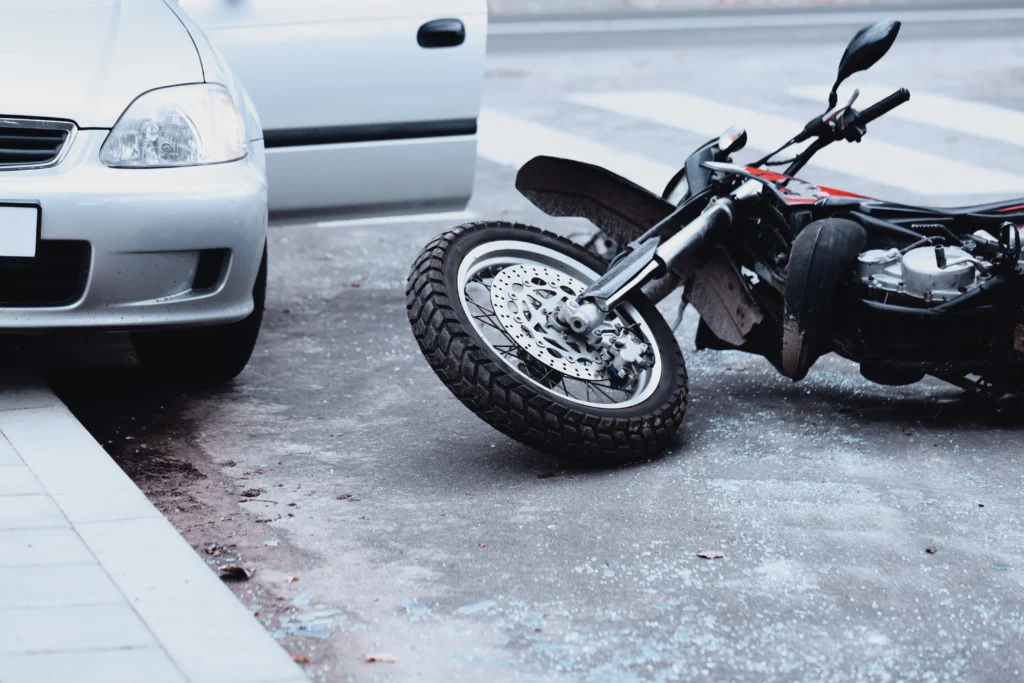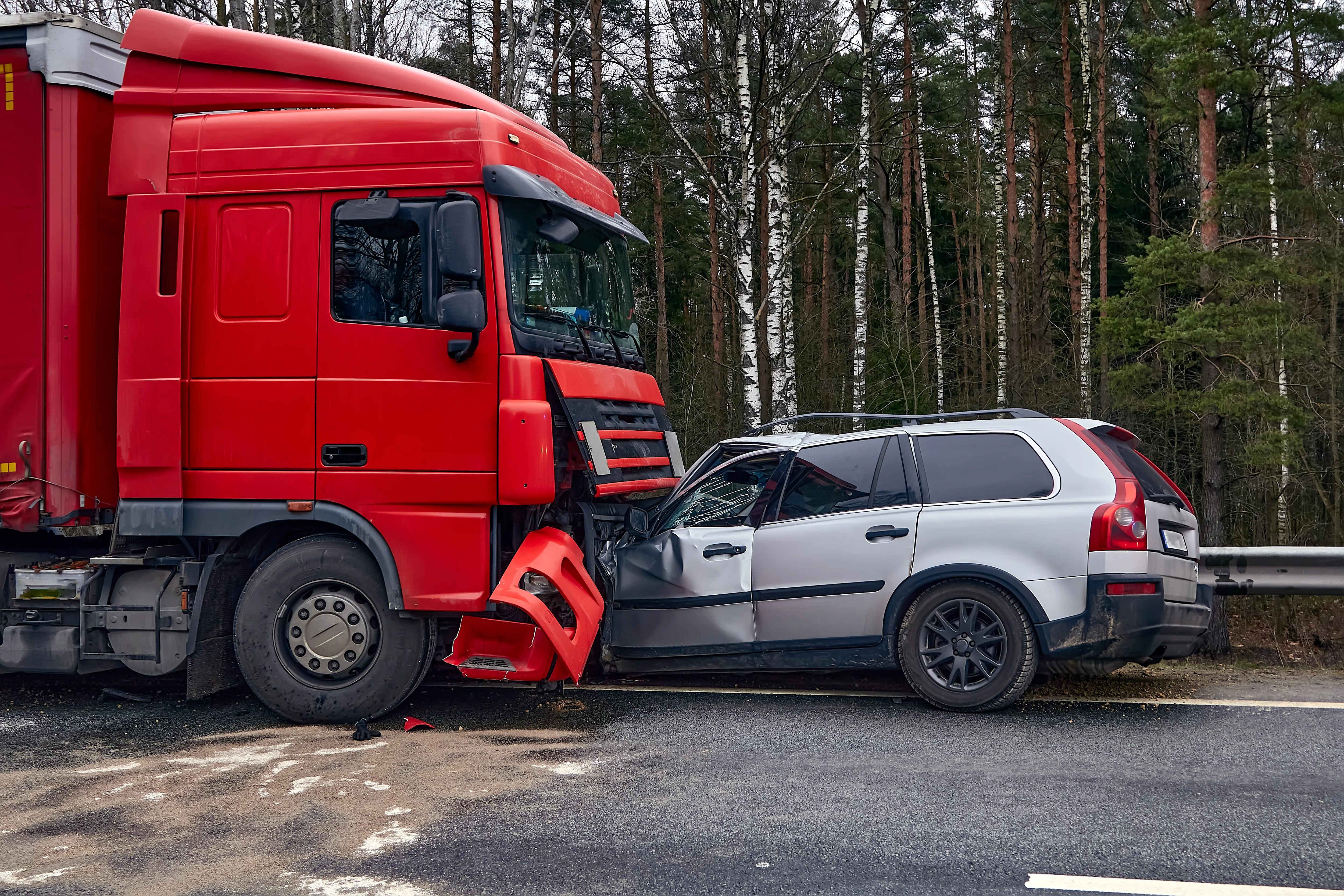Washington Truck Accident Lawyers Serving Spokane, Tacoma, and Beyond
Washington commercial truck crashes on I-90’s mountain passes, SR-167’s freight roads, and other highways have more than traffic jams at stake. They leave victims with spinal damage, lost wages, and medical expenses that fall hard on blue-collar families. At Bernard Law Group, we act promptly and decisively against trucking firms, insurance companies, and commercial carriers after major crashes.
The Federal Motor Carrier Safety Administration reports a consistent rise in big truck crashes across the U.S., with Washington alone seeing more crashes along highways like I-5 and Highway 2 (FMCSA.gov). The majority are preventable, caused by fatigued drivers, skipped inspections, or not enough maintenance.
If a truck hit you anywhere in Washington, you can’t afford to wait. Our team immediately saves electronic logs, dashcam footage, and maintenance records before they’re lost forever. A quick call to 206-752-2233 can change what comes next.
Fast Legal Response After a Washington Truck Accident Strengthens Your Case
After a serious truck collision, every moment counts. While victims are rushed to hospitals in Tacoma or Spokane, trucking companies contact their legal teams to minimize exposure. They send crash response units, secure driver statements, and start building a defense before you even leave the scene. That is exactly why injured individuals need legal representation that moves with urgency. At Bernard Law Group, we begin investigating within hours to prevent evidence loss and protect your right to full compensation.
Large truck accidents on Washington highways often involve multiple vehicles, complex insurance policies, and commercial operators who already have legal teams in place. You deserve the same advantage. Our attorneys act immediately to preserve black box data, locate surveillance footage, and identify every liable party. According to the Insurance Research Council, early legal involvement significantly improves personal injury claim outcomes (iii.org).
Investigating Washington Crash Sites Before Evidence Disappears
Truck crash scenes are cleared quickly, especially on major routes like I-5 or SR-512. Law enforcement focuses on reopening roads, not preserving civil evidence. Once vehicles are moved, valuable clues like skid patterns, gouge marks, and fluid trails vanish. Delay allows trucking companies to reshape the story.
We send trained investigators to gather photos, measure debris fields, and log roadway conditions. Our team uses forensic mapping software and 3D modeling to reconstruct the crash and counter insurance spin. When needed, we pull footage from nearby commercial properties, traffic light cameras, and WSDOT highway feeds. Immediate site control helps us prove negligence with clarity.
Black Ice and Road Hazards That Complicate Truck Wrecks
Winter collisions across Washington often involve hidden road dangers. Black ice on Snoqualmie Pass, flooding near Centralia, or loose gravel along Highway 97 can turn a simple lane change into a deadly slide. Trucking companies may blame the weather, but unsafe speed and poor decision-making are usually to blame.
We examine weather logs, road maintenance records, and emergency response notes to expose factors that contributed to the crash. These details help defeat vague defenses and support claims for full compensation. We regularly handle cases where local governments, subcontractors, or third-party road crews share liability.
Securing ELD and GPS Data From Commercial Trucking Operations
Modern commercial vehicles store hours of detailed driving records. Federal law requires commercial trucks operating in Washington to use electronic logging devices (ELDs) that monitor driving time, vehicle movement, and idle periods. This data can confirm rule-breaking behavior that led to your crash.
Our legal team sends immediate legal holds to prevent deletion of ELD data. We analyze GPS logs, route history, and geofencing data to establish how long the driver had been on the road and whether they took required rest breaks. These records often expose violations of the Federal Motor Carrier Safety Administration’s hours-of-service rules (fmcsa.dot.gov).
Fatigue Violations That Lead to Truck Accidents
Driver fatigue is one of the top causes of trucking collisions. Long-haul drivers operating on minimal sleep make delayed decisions, drift lanes, and brake too late. These mistakes endanger everyone on the road. In Washington, where routes span mountain passes, dense city traffic, and rural stretches, fatigue-related errors often cause catastrophic outcomes.
We compare logbook entries to toll receipts, fuel stops, and timestamped footage. When we catch companies forcing drivers to ignore legal rest periods, we pursue aggressive claims that include punitive damages. Our firm builds strong, fact-based claims that stand up to defense challenges and force accountability.
Preserving Testimony From Eyewitnesses Across Washington
Witness memory fades fast. In the confusion of a truck accident, people remember scenes differently hours or days later. That’s why we act quickly to identify, locate, and interview every witness before insurance companies contact them. Independent statements often counter driver excuses or expose details missing from police reports.
Our team works with 911 call records, dashcam footage, and business surveillance near the crash zone to piece together what happened. In high-traffic areas like Rainier Avenue in Seattle or Division Street in Spokane, neutral witnesses are often the key to proving fault. We document those accounts thoroughly, using signed declarations and audio interviews that support your claim from day one.
First Responder Reports That Strengthen Injury Claims
Police officers, EMTs, and firefighters respond to truck crashes with focus on safety, but their observations also shape legal claims. We collect detailed incident reports, traffic citations, and bodycam footage that help prove negligence. These documents often reveal early admissions from truck drivers, on-scene behavior, and medical concerns that impact your case value.
Our firm routinely obtains reports from Washington State Patrol, local police departments, and regional dispatch agencies. We cross-reference these records with medical documentation and witness testimony to build a complete, defensible case narrative.
Common Causes of Washington Truck Accidents That Demand Legal Action
Truck accidents in Washington rarely happen without warning signs. Fatigue, speeding, overloaded trailers, and failed equipment all play a role in these high-impact collisions. When freight companies push drivers past the limits or skip safety checks, the public pays the price. At Bernard Law Group, we investigate every factor behind the crash and hold each liable party accountable for the harm they caused.
According to the National Highway Traffic Safety Administration, more than 70 percent of fatal large truck crashes involve multiple vehicles, and most victims are occupants of passenger cars (nhtsa.gov). The size of a semi-truck leaves no room for error. When one driver cuts corners, it can result in lifelong injuries or death for everyone else on the road.
Truck Driver Fatigue Remains a Top Cause of Serious Wrecks
Long-haul truckers often spend 11 or more hours behind the wheel on Washington highways. Despite federal rules limiting drive time, some companies pressure drivers to exceed legal limits to meet tight delivery windows. Fatigue dulls reaction times and leads to lane drifting, missed turns, and slow braking, all common causes of rear-end truck crashes.
Our firm reviews ELD logs, cell phone data, weigh station check-ins, and fuel receipts to build a timeline. When we discover drivers exceeded their legal hours or falsified rest periods, we use that evidence to support negligence claims. This is especially critical for injury cases involving commercial trucks along I-90 through Kittitas County or late-night routes along Highway 395.
Studies Show Sleep Deprivation Impairs Driving Like Alcohol
The Centers for Disease Control and Prevention has linked drowsy driving to impaired judgment and delayed reflexes comparable to intoxication (cdc.gov). Yet some drivers continue to operate without proper rest, especially when employers prioritize delivery times over safety. We dig deep to uncover these violations and use them to fight for maximum recovery.
Speeding Trucks on Washington Freeways Cause Catastrophic Damage
When 80,000-pound vehicles exceed posted limits on I-5, I-405, or SR-14, the consequences are often deadly. Speed amplifies force in a crash and limits a truck’s ability to stop safely. This is especially dangerous in areas with steep grades like Snoqualmie Pass or dense urban traffic near Everett.
Many trucking companies allow or even encourage speeding to increase profit margins. When they do, we subpoena vehicle telematics, black box data, and dispatch records to show the company knew about the risk and chose not to stop it.
Traffic Studies Link Speeding Trucks to Fatal Rear-End Crashes
Data from the Washington State Traffic Safety Commission shows that speeding commercial vehicles account for a growing number of fatal wrecks on state highways. In dense zones like SR-512 in Pierce County, speeding semis often cause chain-reaction crashes involving multiple cars. Our legal team has the tools and experience to trace the cause and prove the liability.
Overloaded or Poorly Secured Cargo Turns Trucks Into Weapons
Improper cargo loading affects a truck’s ability to brake, steer, and maintain balance. Shifting freight can cause trailers to tip or jackknife. In some cases, unsecured items fall from trucks entirely, striking nearby vehicles and creating deadly roadway hazards. These incidents are preventable, but they continue to happen across Washington.
We analyze loading manifests, weigh station records, and inspection reports to identify cargo violations. If third-party shippers or warehouse operators contributed to the hazard, we add them to the claim. This multi-party approach often increases the amount available in a settlement or verdict.
Federal Guidelines Require Proper Load Distribution and Tie-Downs
The Federal Motor Carrier Safety Administration requires commercial trucks to follow strict load limits and securement procedures to prevent cargo shift or loss during transit (fmcsa.dot.gov). Violations are common in busy freight corridors like the Port of Tacoma and rural delivery routes near the Tri-Cities. When these violations lead to injury, our firm builds strong claims to demand full accountability.
Mechanical Failures Linked to Missed Inspections or Cheap Repairs
Faulty brakes, worn tires, and broken steering columns are all mechanical issues that can cause a semi-truck to crash. These failures are often the result of skipped maintenance or low-budget repair work. Some trucking companies knowingly delay inspections or cut corners to reduce costs, even when safety is at risk.
We request maintenance logs, mechanic reports, and inspection schedules to uncover negligence. When a trucking company fails to repair a known issue, or ignores an out-of-service order, we use that evidence to demand enhanced compensation.
DOT Inspection Reports Often Reveal Long-Term Negligence
The Department of Transportation requires regular vehicle inspections, but many violations go uncorrected. Our legal team regularly obtains prior inspection histories to show how long the danger existed. These records make it clear when the crash could have been prevented, which adds leverage during negotiations.
Distracted Truck Drivers Increase Risk on Washington Roads
Commercial truck drivers are prohibited from texting or using hand-held devices while driving, but many still do. Whether using navigation apps, messaging dispatch, or streaming video, distracted driving remains a growing factor in serious truck accidents.
In our investigations, we request cell phone records and onboard dashcam footage. If we find a driver was distracted at the moment of impact, we present that evidence clearly to the insurer or jury. Distraction can shift blame and increase the overall case value.
Hands-Free Rules Still Allow Dangerous Multi-Tasking
While federal law allows hands-free use, it does not eliminate the distraction of split attention. Research from the National Safety Council confirms that hands-free is not risk-free and contributes to thousands of crashes each year (nsc.org). We use these findings to strengthen the argument when insurers try to downplay the impact of distracted driving.
Determining Who Is Liable in a Washington Truck Accident Case
Truck accident cases in Washington often involve more than just the driver behind the wheel. These crashes can stem from decisions made by freight companies, cargo loaders, maintenance contractors, or even third-party dispatchers. When lives are disrupted by these preventable collisions, accountability must follow every link in the chain. At Bernard Law Group, we uncover every responsible party and pursue full recovery from each one.
Under Washington law, liability extends beyond the cab. When a driver operates under a company’s authority, that business can be held accountable for the crash. We use federal transportation records, employment contracts, and cargo agreements to trace who had control over the vehicle and who cut safety corners to keep delivery schedules. According to the American Association for Justice, layered liability is common in commercial truck litigation and requires fast legal intervention to preserve evidence and expose fault.
Truck Drivers Hold Legal Responsibility When Safety Is Ignored
Truck operators are held to a higher duty of care than regular motorists. They must follow strict hours-of-service limits, complete pre-trip inspections, and maintain control over massive vehicles in high-risk corridors like I-5 and SR-18. When drivers ignore these duties, the consequences are often life-altering for Washington families.
At Bernard Law Group, we examine driver histories, ELD records, and crash scene reports to determine whether a preventable error played a role. Common issues include speeding, distracted driving, and failure to yield during lane changes or left turns. We use that evidence to hold the driver fully liable and to identify whether larger forces encouraged dangerous decisions.
Negligent Driving Patterns Often Appear Across Multiple Routes
Many truck accident claims involve repeat behavior. We analyze prior collision records, prior violations logged by the FMCSA, and police citations from previous routes. This helps us establish a pattern of negligence, which often opens the door for punitive damages. Drivers who consistently disregard traffic laws can’t hide behind a company uniform.
Freight Companies Are Liable for Pressuring Drivers and Skipping Safety
Washington trucking companies are responsible for hiring qualified drivers, maintaining safe equipment, and following federal safety protocols. When they skip background checks, push drivers past legal hours, or ignore maintenance logs, they contribute directly to deadly crashes. We hold these companies accountable under federal and state law.
Using company records, dispatch instructions, and internal communications, we prove how these business decisions led to unsafe conditions on public roads. Whether a crash occurred near a Port of Seattle distribution center or on a long-haul route toward Spokane, freight carriers cannot dodge liability when they prioritize speed over safety.
Corporate Negligence Adds Significant Value to Truck Claims
When our investigations reveal that a company violated safety rules or turned a blind eye to driver fatigue, we pursue broader damages. Corporate negligence often leads to higher settlements or jury verdicts, especially when profit-driven decisions put others in danger. These cases often involve violations of the FMCSA’s “duty to ensure” provisions (fmcsa.dot.gov).
Cargo Loaders and Warehouse Contractors May Share the Blame
Improper loading is a common but overlooked cause of truck crashes. Shifting loads can cause trailers to overturn or jackknife, especially on winding roads through Pierce County or Yakima Valley. When warehouse workers fail to balance freight or secure cargo using industry-standard methods, the outcome can be deadly.
We request manifests, forklift logs, and shipping documents to trace back who handled the load and how it was distributed. If an outside contractor or shipper contributed to the hazard, we include them in the claim. This approach increases the total insurance pool available for recovery.
Load Violations Can Be Proved Through Weigh Station and Scale Data
We work with public records from Washington weigh stations and DOT compliance inspections to identify overloading. In many cases, scale bypass or skipped weigh-in logs reveal attempts to avoid detection. We use these findings to support claims against the parties who loaded or approved the truck for service.
Maintenance Companies Can Be Liable for Missed Inspections and Unsafe Repairs
Many Washington trucking companies outsource repair and inspection work to third-party shops. When those shops ignore safety codes, overlook wear, or sign off on incomplete work, they can be named in the claim. These cases often involve failed brake systems, steering defects, or tire blowouts on steep grades.
Our attorneys subpoena maintenance records, service logs, and mechanic statements to trace what was missed and when. When a crash results from mechanical failure that should have been caught, we hold the shop financially responsible.
Federal Guidelines Require Strict Service Protocols
Under Department of Transportation rules, all commercial trucks must undergo periodic safety inspections that include brakes, tires, lights, and suspension systems. These inspections must be documented and available on demand (transportation.gov). When records show skipped maintenance or falsified logs, we present that evidence during settlement negotiations and trial.
Public Agencies May Share Liability When Road Conditions Cause a Crash
In some Washington truck accidents, the fault lies not with the driver but with the road itself. Potholes, missing signage, malfunctioning signals, or poorly maintained highways can all contribute to serious injuries. In these cases, we pursue government liability through the Washington State Tort Claims Act.
We work with road design engineers, maintenance contractors, and public works departments to determine whether the conditions violated safety standards. In cases involving construction zones or school routes, we also check for missing barriers or lighting failures. These details help expand liability and improve case value.
Serious Injuries From Washington Truck Accidents Along Routes Like I 5 and SR 14
Truck crashes across Washington highways leave more than mangled steel behind. They leave workers unable to return to jobs, parents missing weeks of pay, and families left with long-term medical costs. The size and weight of commercial vehicles make collisions especially violent. When a tractor-trailer collides with a passenger vehicle at full speed, the human body takes the full force of that impact.
At Bernard Law Group, we handle injury claims for people hit on Washington roads like I-5 through Olympia, Highway 2 in Wenatchee, and SR-14 near Vancouver. We work fast to document injury severity, track ongoing treatment, and prove how these injuries impact everyday life.
Traumatic Brain Injuries After Truck Collisions on Rain-Slick Roads
Head injuries remain one of the most common and most misunderstood consequences of semi-truck wrecks. Even low-speed impacts can jolt the brain against the skull and cause lasting damage. Victims often experience memory issues, sleep disorders, sensitivity to light, and personality changes in the weeks after a crash.
On wet roads in Seattle, Tacoma, or Spokane, these injuries often go unnoticed at first. But as time passes, symptoms intensify and disrupt work, school, and relationships. We work with neurologists and neuropsychologists across Washington to document cognitive changes and link them directly to the crash. These records allow us to demand compensation that reflects long-term care, loss of income, and emotional toll.
Concussions and Brain Swelling Often Go Undiagnosed in Early ER Visits
Many emergency rooms focus on life-threatening injuries and overlook subtle signs of brain trauma. As a result, victims leave without a diagnosis. Days later, symptoms begin to emerge. The Brain Injury Association of America reports that concussions frequently go unrecorded without follow-up. We ensure that delayed symptoms are captured and included in the claim.
Spine and Back Injuries Common Along I 90 Truck Routes Through the Cascades
Spinal trauma from truck collisions ranges from herniated discs to complete loss of function. These injuries affect everything from walking to lifting a child. Victims often face surgery, long-term physical therapy, and chronic pain that prevents them from returning to labor-intensive jobs.
Our legal team documents MRIs, EMG studies, and mobility assessments to show how the crash altered your body’s structure and function. In Washington counties where construction and manufacturing jobs dominate, back injuries are career-ending. We include those wage losses and treatment costs in every claim.
Spinal Compression and Nerve Damage Create Lifelong Medical Needs
Crashes on winding roads like Highway 12 through Lewis County or sharp off-ramps in Bellevue often cause awkward force on the spine. Nerves become pinched, muscles deteriorate, and inflammation spreads. We work with physical therapists and orthopedic surgeons to show insurers that the pain is real and the damage permanent.
Bone Fractures and Orthopedic Injuries in King and Snohomish County Truck Crashes
Bone breaks in truck accidents happen fast and without warning. Victims suffer crushed ankles, shattered femurs, fractured ribs, and broken arms while bracing for impact. These injuries require surgeries, plates, rods, and follow-up care that may last years. In the most severe cases, limbs never fully heal.
We use operative reports, x-rays, and orthopedic treatment notes to prove the extent of the injury. If complications develop, such as infections or failed implants, we factor those setbacks into settlement demands. These injuries are especially common in rollover crashes near urban interchanges or rural truck corridors.
Joint Injuries Often Involve the Knee, Shoulder, or Wrist
When a victim slams into the dashboard or is crushed between seat and door, joint damage becomes likely. Torn ligaments, displaced kneecaps, and fractured clavicles often require long recovery timelines and can limit mobility for good. These injuries deserve full compensation, not minimized payouts.
Internal Injuries and Organ Damage After Underride or Rear Impact Wrecks
Blunt force trauma in truck accidents can cause internal bleeding, punctured lungs, ruptured spleens, and intestinal damage. These injuries are not always visible at the scene, but they require immediate emergency care to prevent death. We include these emergency responses and hospitalizations in every demand package.
Crashes on fast-moving routes like SR-18 or I-82 often produce these silent injuries when seatbelts and airbags compress the chest and abdomen. Internal damage usually leads to ICU care, long-term rehab, and sometimes multiple operations. Our team works with trauma teams across Washington to fully document this type of harm.
Post-Crash Surgeries and Extended Hospital Stays Increase Financial Burdens
Internal injuries often require prolonged hospital care, multiple surgeries, and follow-up scans. According to the Agency for Healthcare Research and Quality, truck crash victims who suffer organ damage face hospital stays up to four times longer than car accident victims. These expenses must be reflected in your final compensation.
Amputations and Permanent Disabilities Along Washington’s Freight Corridors
When a pedestrian, bicyclist, or car occupant is hit by a commercial truck, the injuries can be catastrophic. In some cases, doctors are forced to remove limbs to save the victim’s life. These amputations come with permanent consequences, including prosthetic costs, loss of independence, and deep emotional trauma.
We work with medical professionals to estimate the cost of lifetime care, adaptive equipment, and psychological support. When a crash removes a person’s ability to walk, drive, or perform daily functions, compensation must match the scale of loss. These claims often involve vocational retraining and life care planning to show the long-term impact.
Disfigurement and Scarring Add to Emotional and Financial Pain
Truck crash survivors often carry permanent reminders of the impact. Severe lacerations, burns from fuel fires, or facial fractures result in long-term disfigurement. Scars across the face, arms, or legs often lead to depression, social withdrawal, and chronic self-esteem issues. These damages are real and deserve full valuation under Washington injury law.
Call Washington Truck Accident Lawyers Who Move Fast and Fight Hard
If you were hit by a commercial truck anywhere in Washington, you need legal action that starts today. At Bernard Law Group, we do not delay. We begin investigating from the first call. Our team secures black box data, tracks down witnesses, and forces insurance companies to deal with the facts. Whether your crash happened outside Spokane, along I-5 near Everett, or on the dangerous curves of SR-14 through Clark County, we know how to take control of the claim.
Truck carriers protect themselves with teams of lawyers. You deserve a law firm that pushes back with real evidence and proven results. Our Washington truck accident attorneys prepare every case as if it is heading to trial. That pressure often forces higher settlements and stronger outcomes. We work with medical professionals, forensic analysts, and legal strategists to document every part of your injury, loss, and future need.
Call 206-752-2233 or fill out our online form to get started. We are available 24 hours a day. If you cannot travel, we will come to you. Let our Washington truck accident attorneys take over the legal fight so you can focus on recovery.
Practice Areas
Trust Us With Your Personal Injury Claim
If you or a loved one have been injured, Bernard Law Group will fight for you every step of the way. We will give our all to secure the compensation you rightfully deserve.
Contact usfor a free consultation.
Phone: (206) 312-3908









